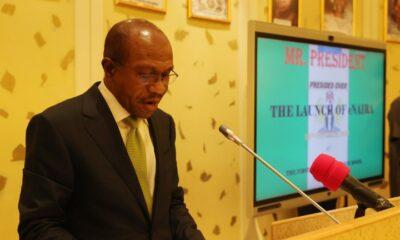The Central Bank of Nigeria (CBN) has reinstated Sola Adeduntan as the managing director and chief executive officer of First Bank of Nigeria Limited.
Following the latest action of the Board of FBN Ltd to retire Dr. Sola Adeduntan and replace him with his deputy, Mr. Gbenga Shobo outside of the apex bank’s consent, the CBN took the decision to issue all members of the Board of FBN Ltd and FBN Holding, a red card, naming an interim Board headed by the now reinstated Dr. Adeduntan.
On Wednesday, the CBN had queried the board of First Bank of Nigeria Limited over the removal of Sola Adeduntan, without due consultation with regulatory authorities.
“The CBN was not made aware of any report from the board indicting the managing director of any wrong-doing or misconduct; there appears to be no apparent justification for the precipitate removal,” the letter signed by Haruna Mustafa, CBN’s director of banking supervision, read.
“We are particularly concerned because the action is coming at a time the CBN has provided various regulatory forbearances and liquidity support to reposition the bank, which has enhanced its asset quality, capital adequacy, and liquidity ratios amongst other prudential indicators.
“It is also curious to observe that the sudden removal of the MD/CEO was done about eight months to the expiry of his second tenure, which is due on December 31, 2021.”
The governor of the central bank, Godwin Emefiele affirmed that the removal of Adedutan was unlawful and ordered the immediate removal of all directors of FBN Limited and FBN Holdings Plc.
Speaking during the press briefing on Thursday evening, Mr. Emefiele stated that the apex bank had been keeping close tabs on First Bank Nigeria over the past 5 years have discovered that the bank was in “grave financial condition with its capital adequacy ratio (CAR) and non-performing loans ratio (NPL) substantially breaching acceptable prudential standards.”
According to Emefiele, “The insiders who took loans in the bank, with controlling influence on the board of directors, failed to adhere to the terms for the restructuring of their credit facilities which contributed to the poor financial state of the bank. The CBN’s recent target examination as at December 31, 2020, revealed that insider loans were materially non-compliant with restructuring terms (e.g. non-perfection of lien on shares/collateral arrangements) for over 3 years despite several regulatory reminders. The bank has not also divested its non-permissible holdings in non-financial entities in line with regulatory directives.
“This is a bank where depositors’ fund is almost 10 times shareholders’ fund, our interest is to protect depositors and minority shareholders who have no voice in this business. We will not sit idle and allow this to continue.
“I spoke to Mr. Oba Otudeko (chairman of First Bank Holdings), he refused to grant my entreaties. I had to call two of his major shareholders to call him to ask the board not to take such decisions without the approval of the CBN. He refused to pick the calls of these shareholders — who are also owners of the bank.
“I called him the second time, I heard on another phone one of the shareholders begging him not to take that decision, he insisted on taking that decision. I sent the shareholder back to the office of Mr. Oba Otudeko to appeal to him to suspend the decision, he refused to see the shareholder. I feel we have done our best and we would not allow a shareholder who cannot subject himself to regulatory control and authority to remain as the director of a bank.” Emefiele said.
The apex bank, however, directed U.K. Eke to remain as the group chief executive officer of FBN Holdings Plc.
Remi Babalola is the interim chairman of FBN Holdings Plc, other members include, Peter Aliugo, Fatade Oluwole, Kofo Dosekun, Remi Lasaki, Alimi Abdulrasaq, Ahmed Modibo, and Khalifa Iman.
Tunde Hassan-Odukale is the new chairman of First Bank Limited, other members include Tokunbo Martins, Uche Nwokedi, Adekunle Sonola, Isioma Ogodazi, Ebenezer Olufowose, Ishaya Dodo, Sola Adeduntan as managing director, Remi Oni, Gbenga Sobo and Abdullahi Ibrahim




 Naira4 weeks ago
Naira4 weeks ago


 Naira4 weeks ago
Naira4 weeks ago


 Travel4 weeks ago
Travel4 weeks ago
 Naira3 weeks ago
Naira3 weeks ago


 Jobs4 weeks ago
Jobs4 weeks ago
 Naira4 weeks ago
Naira4 weeks ago
 Investment4 weeks ago
Investment4 weeks ago
 Travel4 weeks ago
Travel4 weeks ago
















